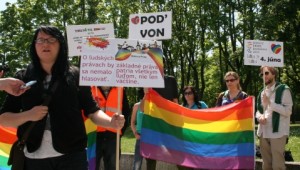The upcoming referendum on the tightening of the legal definition of ‘family’ in Slovakia is a political issue that is causing much public discussion. The interesting aspect of this discussion is that the scope for balance and positivity is relatively low. We can look at examples in the media. An article from ‘The Economist’ gives a reasonable write up on the issue but I have been told that the Slovak translation changes the angle of the piece to a far more negative one. We can also look to the power of the Catholic Church, with sermons being written on the topic of the referendum which seeks to legally define whether marriage should be between exclusively a man and a woman, the rights of same sex couples to adopt, sex education in schools and the teaching of euthanasia.
Ten points for guessing the churches stance on that.

As I have said the scope for reasonable discussion on this topic is rather low. This could be due to the emotional aspects of the questions and the powerful history behind people’s points of view. I’m from Scotland and the first same-sex marriages took place in December 2014. Same-sex couples have been allowed to foster and adopt children with the same rights as everyone else since 2009. Where I am from there is a strong culture of freedom (“freedom!”), equality and acceptance. People are proud of these aspects of their culture. Most people in Scotland strongly support rights and freedoms for everyone and this, obviously in my opinion, includes LGBT rights. My country also has a history of left-wing ideals and liberal approaches. The fact that people still question whether human beings, who are exactly the same as them par sexual orientation, should have access to the same rights as everyone else is madness to me.
When I moved to Slovakia back in June, gay marriage was a hot topic within the EU. I decided to cover this issue in class. I thought it would be good scope for some different opinions and I concluded that it would get people talking. I was very right but not very prepared for the opinions I was about to hear.
I started by asking those who supported gay marriage to raise their hand. Nobody did. I was really confused. Did they not understand the question? Was I talking too fast? I repeated and still, no hands. The same happened with all 6 of my classes.

Now I know and respect and care about my students so I do understand why they think this, even if I do not agree. They have been brought up in a very different culture to me. Slovakia is a country that is greatly influenced by Catholicism. It is the only country in the world funded by the Vatican. It is also a reasonably new independent country and ideals are still developing. People have very good hearts and they tell me that they are not homophobic, they are child-centered. In my opinion, this is very sweet but also very misguided. A popular opinion is that by allowing people of same-sex marriage to adopt, the child would most likely be gay too.
What? That is a completely flawed theory. In that case, how do heterosexual parents have homosexual children? I honestly can’t believe people think this way. If I ask: what would be better for Slovak orphans, being raised in a children’s home or being raised by loving gay parents? Some look genuinely troubled like I’ve asked a difficult question. Others are reasonable and agree that this would be a step forward but they do not have much faith in it happening.
Another line of opinion that has troubled me is that many people have used the word ‘perverse’ when discussing these issues. What is that word doing in this discussion? What is perverse about any of it? A couple of people have said that gay expression is ‘perverse’. Well, I hate to be the bearer of bad news but in the grand scheme of the world, a lot of things are. And I don’t think 2 consenting adults will be topping that chart any time soon.
The attitude to this issue is a real shame because Slovakia has so much progressive social legislation. I don’t know why this referendum is happening. Why isn’t the decision being made in parliament? A referendum is a cowardly way for politicians to look like they are doing something on this ‘issue’ but they know, and the Slovak people know, and I know that equal rights for everyone in this country is still a far way off.
To the Slovak LGBT community I say: make a fuss. Get protesting, vote for your rights. It’s a shame you even have to vote and it’s a travesty you even have people opposing you but keep fighting. Don’t let anyone make you feel unaccepted.
I really hope that the outcome of the referendum is a positive one. If marriage becomes legally defined as a bond between a man and a woman and if same-sex couples are banned from adopting it will be a sad step backwards, a step in the very wrong direction. I doubt the 50% percent turn out to make the referendum valid will be achieved and if it is, I doubt the result will be positive. I really hope I get proven wrong on this one.
By Alona Cameron (teacher with The Bridge).


@monica. What if a man or woman can’t have children. IVF is not natural nor is adoption. So saying just because 2 men can’t reproduce is silly.
Glad low turnout. What a waste. Leave the
LGBT community alone and let’s worry about corruption and fixing archaic laws!
@Alona:
‘Isn’t the right for everyone to love, marry and have children a pretty good place to start?’
1.Two men/women can not have children naturally. Even if they had the right to, they can not form a family.
2. Right for everyone to love, marry, have children as they wish – why is polygamia not allowed then? how does it differ from the rights of gay that some wish to marry 2 women, lets say? one is not OK, other is OK? wher eis the line and who draws it?
Hey guys, thanks for the comments.
I think that pro-heterosexuality and anti-homophobia are one in the same. To put the rights of one group of people above the other is wrong, isn’t it? We all believe it’s wrong to do so when it comes to other ‘groupings’ of people, so why not on this one?
People also tend to express the opinion that there are bigger social issues to be fought for and discussed. Isn’t the right for everyone to love, marry and have children a pretty good place to start?
I believe if a Christian God made gays it would want them to have equal rights. EU courts probably take a similar view.
But this referendum is not a step backwards, its a vote for the status quo. And until recently it was the status quo in Western Europe too. Much of the critism of this vote comes from people with the implicit belief that “change”==”progress” . That is not true.
It can be argued that it is good that people are engaging in democratic institutions. The priority given this issue is a liitle strange but like the article says you have to repect its a different culture and the west in 2015 doesn’t have all the answers.
If the organising groups can learn lessons from this and mobilise for other less divisive issues, then I’d suggest that this could be a force for good.
The average Slovak who believes in marriage does so not out of ignorance, discrimination or homophobia. He does so because he believes in the natural institution of marriage, family centredness and the best interests of children. To suggest otherwise curtails a fair and democratic debate and denies freedom of expression.
At the end of the day, the role of law is to protect a compelling government interest. The government does not have an interest recognizing the love of two individuals. If it did, perhaps we can than discuss legal recognition of best friendships and all other forms of relationships. The government does however, have the most compelling of reasons to legislate the natural institution of marriage and to promote a healthy marriage culture. Healthy families mean a better economy, less crime, less social dischord, higher fertility rates and all around national prosperity. Those who try to define the debate as being about equality are spotting the fern seed but ignoring the elephant. This referendum not only embraces several very important government and societal interests, it also celebrates the family and our future through our children.
So much for FREEDOM. This behavior is known as censorship.
I really like your article Alona and your openness about where you work and what you were trying to do in raising this important issue. I gather though that the fewer people who vote the better. I may be wrong but I heard that there needs to be a certain percentage turnout for the voting to be valid. Therefore the fewer voters who turn out, the better for the LGBT cause.
BRAVEHEART. I think this would bring up a few discussions. Perhaps one would be if a minister/priest were to marry said man and woman and they later found out he was gay would they still be legally married according to the laws of that particular church? Thought Pope Francis had a statement on this.Like the discussion.
‘ I don’t know why this referendum is happening. Why isn’t the decision being made in parliament?’
It is because over 400 000 people signed a petition demanding a referendum about this issue.
I believe Slovaks are indeed not homophobic. This is not an anti-gay referendum. This is a pro-heterosexuals referendum, pro-traditional family. There is a difference between the two. Some people here believe that the LGBT is a propaganda coming from the West and being pushed through in order to destroy the most fundamental aspects of a society by creating ‘lost’, ‘weak’ human beings that would be easier to manipulate than those with strong rooted personalities & values. And also, probably more importantly. that it might be misused for purposes other than the rights equal for all. It’s strange that politicians tend not to be fighting for rights of any minorities anywhere, but for this there is much support among them.